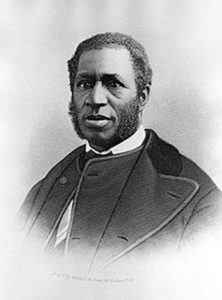
Richard Cain
This date recalls the birth of Richard Harvey Cain, born in 1825. He was a Black political and civic leader.
From Virginia, born to free parents, Cain and his family moved to Gallipolis, Ohio, in 1831. He attended school and worked on the steamboats along the Ohio River. Cain entered the ministry in Hannibal, Missouri, in 1844 but was unhappy with their segregation practices.
In 1848, he joined the African Methodist Episcopal Church and was a minister in Muscatine, Iowa. In 1865, through the A.M.E. Church, Cain went to South Carolina, where he was a delegate to the state constitutional convention of 1868 and a state senate member from 1868 to 1870. During this time, Richard Cain published and edited the South Carolina Leader, later renamed the Missionary Record.
In 1872, he was elected to an at-large seat in the House of Representatives. He took a seat on the Committee of Agriculture with the forty-third Congress. He worked on the passage of a civil rights bill introduced in 1870, with a speech about his personal experiences during a trip to Washington D.C. After eliminating his seat, he declined to seek re-nomination but actively reformed the Republican Party.
In 1876, Cain was again elected to Congress from the second district. In the forty-fifth Congress, he served on the Committee of Private Claims. He became a bishop in the A.M.E. Church in 1880, helped set up Paul Quinn College in Waco, Texas, and served as its president until 1884. Richard Cain returned to Washington, where he died on January 18th, 1887.
Black Americans In Congress 1870-1989.
Bruce A. Ragsdale & Joel D. Treese
U.S. Government Printing Office
Raymond W. Smock, historian and director 1990
E185.96.R25